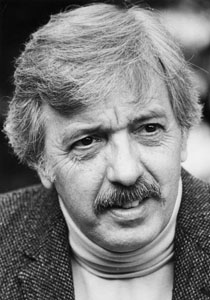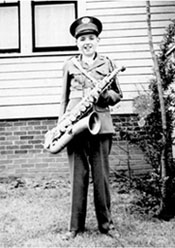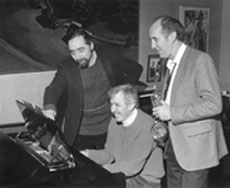FREDERICK FOX (IU faculty: 1974-1997)

Official Website and Archive of Compositions
Biography
Biographical notes provided by Brian Fox
Usually when musicians and composers look back on their careers and lives, they often point out that it’s been all about “the music.” And, holding true to form, former Jacobs School of Music professor of music, Frederick A. Fox, concurs. “Yes, that’s correct,” he said. “At the core, it’s always been the music.”
For Fox, the “music” started in junior high school when he began playing the saxophone. By his late teens and early 20s, it began to gain strength when he toured the Midwest as part of big band jazz ensembles, playing the instrument he always had, the tenor sax. The music began to take on increasing importance when he began to write small interludes and introductory pieces to the big band numbers. It was only then he realized he had found his calling in life—a composer of music.
Now 80 years of age, Professor Fox retired from Indiana University and the Jacobs School of Music in April 1997. He had served I.U. and the music school as professor of composition for 23 years, 13 of which were as chairman of the composition department. A notable achievement of his was the founding of the I.U. New Music Ensemble in 1975, which today, 35 years later, continues to thrive. But Fox’s arrival at the School of Music (as it was then called) in 1974 was actually a homecoming of sorts, for he had attended and graduated from the institution in the 1950s, receiving, in music composition, both his M.Mus. (1957) and D.Mus. (1959) degrees.
Beginnings and Development
Frederick Alfred Fox, Jr. was born January 17, 1931 in Detroit, Michigan to Frederick Alfred Fox, Sr. and Otha Esther Smith. He was the first and only child of Frederick, Sr., a carpenter and salesman, and Otha, a homemaker. Frederick Fox, Sr. was Canadian by birth. In 1900 at the age of 10, he immigrated to the United States with his family and became a U.S. citizen due to his service in the army during World War I. His great-grandfather and great-grandmother had come to Ontario (then Upper Canada) from England in the early 1830s. Otha Smith was from rural central Arkansas, a daughter of a logger and jack-of-all trades. Her family lineage stretches far back in U.S. history and is concentrated in the southern states. Frederick A. Fox, Jr. is of Scots-Irish, English, and German ancestry.
In Detroit, Frederick, Jr. had a typical childhood but was aware of the struggles of many as the Depression continued to linger. It was in junior high school that he began to play saxophone on his own accord. In high school, he participated in the school marching and concert bands and has both good and not-so-good memories of performing during halftimes at football games.
By the age of 15, he was playing sax in pick-up dance hall jazz bands in Detroit, and at 17, taking private lessons with Laurence (Larry) Teal. Band road trips then ensued, with regular visits to many of the larger cities of the Midwest, including St. Louis, Chicago, Indianapolis, among others. His favorite city to visit, of which he has many fond memories, was New Orleans. It was during these road trips that Fox began to tinker with composing, penning interludes and intros as complements to the band’s standard numbers. He recalls that as his musical arrangements become longer and more involved, a band mate suggested that he start composing his own music.
As his interest in composition and arranging deepened, Fox was frequently counseled by Ray McConnell, with whom he had had a musical relationship with since his teen years. He subsequently studied composition with Ruth Shaw Wiley at Wayne State University and, following graduation from that institution (B.Mus.), he worked for a year with Ross Lee Finney at the University of Michigan. But with an abiding interest in jazz, Fox soon found himself again touring as a saxophonist. By 1955, however, he had turned his energies to serious composing and enrolled at Indiana University to study composition under Bernhard Heiden.
Of his studies with Heiden, Fox noted that “Bernhard never imposed,” that he “never overtly tried to influence my music.” For that, Fox added pointedly, he was very grateful. He took Heiden’s hands-off approach as “subtle, tacit encouragement.” Heiden, Fox said, “was aware I was going off in another direction from his own music, but he never said anything to me about this.” In terms of learning, Heiden emphasized the importance of form and structure of a piece, and that “sank in.” “I have many fond memories of Bernhard,” he concluded.
Teacher and Composer
After acquiring his doctorate in composition from the I.U. School of Music in 1959, Fox began an odyssey that carried him to various teaching and foundations posts around the United States. He initially taught at Franklin College in Franklin, Indiana, where he constituted the entire music faculty. Fox then went to Sam Houston State University in Texas, after which, in 1962, he was one of a handful of composers selected by the National Music Council to serve as composers-in-residence to the nation’s public schools; he accepted a position with the Minneapolis Public Schools. The Ford Foundation then become involved with the project, and Fox assumed a post that took him and family to Washington, D.C.
In 1964, Fox was appointed chair of music theory and composition in the music department at California State University at Hayward (now California State University, East Bay). Later, from 1970–72, he served as chair of the music department itself. During his time at the institution, enrollment in the music department blossomed from 60 students to nearly 500.
When the world renown Indiana University School of Music came calling in 1974, Fox realized it was a dream come true, and he eagerly returned to the school he once attended, as professor of composition. Taking notice that little new music was being performed by the school’s ensembles, one of his first undertakings was the founding of the Indiana University New Music Ensemble in 1975–76, with himself as its first director. During his leadership tenure, the ensemble began to take its place as one of the foremost university ensembles of its kind in the country; it has since toured to cities such as Chicago, Washington, D.C., San Francisco, New York, among others. Fox was appointed chair of the I.U. School of Music composition department in 1981, and led that department for 13 years, a period during which it gained increasing recognition and became one of the highest-ranked programs in the U.S.
Throughout his long career, Fox always considered himself a “composer who teaches,” rather than a “teacher who composes.” Again, the maxim “it’s all about the music” comes to the forefront. But Fox took teaching seriously and is proud to have contributed to the musical education of hundreds of students, many of whom graduated from the music school with masters’ and doctorate degrees. Some of his notable students, to name a few, include James Aikman, Margaret Brouwer, David Dzubay, Keith Fitch, Jeffrey Hass, Jeeyoung Kim, Robert Patterson, Mark Phillips, Stephen Suber. Several of his former students have gone on to prominent teaching posts of their own in the United States as well as other countries.
The Music
Fox’s music, in a general sense, can be categorized as contemporary classical music. To be a bit more specific, he will reluctantly admit that the term postmodernism can be applied, to some extent. Although musical labels and categorization are something Fox tends to shy from, particularly in terms of his own music, he’s cognizant they can be of use to some people to more fully appreciate music, and that he finds worthwhile.
Like many young American composers in the Fifties and Sixties, Fox had some experience as a jazz performer and arranger before he took up composing. His music grows principally out of this background, experience, and interest in jazz, in addition to serial techniques, and some informal systematic formulations which tend to posses qualities of improvisation. Though he found serialism to be essentially at odds with his creative outlook, Fox’s jazz background was to find its echo in several of his characteristic works.
Fox considers the music of Béla Bartok to be the main influence on his compositional style and structure, followed closely by Anton Webern’s. He notes, as well, the music of Stravinsky, Schoenberg, and Debussy (in that descending order) also had an impact, but to a much lesser extent. Bebop jazz, especially the “melodical-driven” sound of Charlie Parker, was also a major influence. Fox notes that his music “continued to breakdown the diatonic structure to make it more chromatic” but that he “doesn’t consider tonality when composing.”
From the beginning of his compositional career in the 1960s to up into the late 1990s, Fox was continually composing. His extensive catalog, which numbers upwards of 80 compositions, includes several orchestral and concerted works, a substantial amount of chamber music, several choral pieces, as well as a dozen or so solo instrumental works.
Professor Fox passed away August 24, 2011. He is survived by his wife, Ramona, three grown sons, Brian, Eric, and Curtis, and two granddaughters, Eleanor and Anna.
Selected Compositions
Orchestra
Impressions(1995)
Echo Blues (1992)
Januaries (1984)
Night Ceremonies (1979)
String Orchestra
Nightscenes (1988)
Symphonic Band
Four Times Round (1996)
Ensemble/Chamber
Blind Time (1996)
Dreamcatcher (1994)
Devil’s Tramping Ground (1991)
The Avenging Spirit (1989)
Shaking the Pumpkin (1986)
Dawnen Grey (1984)
Sonaspheres 5 (1983)
S.A.X. (1979)
Ambient Shadows (1978)
Solo
When the Thunder Speaks (1998)
Kokopelli (1994)
Hear Again in Memory (1991)
Annexus (1980)
Selected Discography
The Music of Frederick Fox - Indiana University Jacobs School of Music, 1992
The Music of Frederick Fox, Vol. 2 - Indiana University Jacobs School of Music, 2000
New Music from Indiana University, Vol. 2 - Indiana University Jacobs School of Music, 1998
Trio Indiana - Crystal Records, Inc., 1996
Zagreb Saxophone Quartet with Eugene Rousseau. Tsunagari - Zagrebacka banka, 2002

